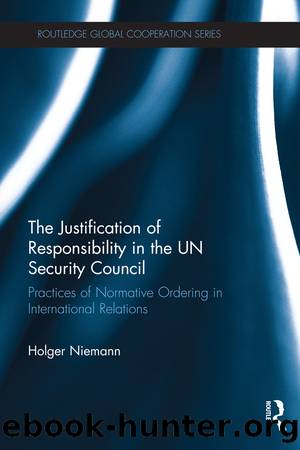The Justification of Responsibility in the Un Security Council: Practices of Normative Ordering in International Relations by Holger Niemann

Author:Holger Niemann [Niemann, Holger]
Language: eng
Format: epub
Tags: International Relations, Developing & Emerging Countries, Social Science, Peace, Political Science, General
ISBN: 9781351336932
Google: RjduDwAAQBAJ
Goodreads: 40591099
Publisher: Routledge
Published: 2018-09-04T00:00:00+00:00
Hence, compliance embodies a normative worth of procedures by a constraining as well as an enabling capacity. In this line of argument, there was also a discussion that compliance would be essential for protecting the Councilâs responsibility to maintain international peace from a potential violation through unilateral action. At the very beginning of the controversy, on 17 October 2002, Christian Wenaweser, the Liechtensteinian representative to the UN, argued that âensuring full compliance with its decisions is indispensable for the Councilâs credibilityâ. Furthermore, the Council âmust do everything possible, and be seen as doing everything possible, to ensure compliance with and implementation of its decisions without resorting to the use of forceâ (Wenaweser, Liechtenstein, 17 October 2002, S/PV.4625 (Resumption 2): 14). This shows that, Wenaweser explicitly considered untimely military action a threat to the Councilâs responsibility, as it would violate the obligation to exhaust every possibility for refraining from the use of force.
Besides compliance, unity was also stressed to explicate the normative worth of procedures. Unity was of importance during the Iraq crisis, as it pointed to the deep rift among Council members and the potential threat of being unable to carry out collective security. Furthermore, it stresses the socialising power of rules and obligations that help to establish a community of Council members constituted by the shared belief in the importance of these rules. Occassionally not adhering to these rules and oblications was criticised as a potential threat to Council unity (Duclos, France, S/PV.4683: 3). The division of the Council was often criticised by both supporters and opponents of military action. Both parties stressed the importance of unity among all Council members. This was especially the case because Resolution 1441 was adopted unanimously and was, therefore, used as a symbol for competing purposes: to underline the Councilâs ability to re-unite even in times of deepest controversy and to live up to its responsibility and engage in collective action. Furthermore, the continuity of Iraq as one of the Councilâs most enduring agenda items was also used to emphasise Council unity as an important procedural element of its responsibility. Germanyâs Foreign Minister, for example, argued: âAs a matter of principle, the unity of the Council is of central importance in this contextâ (Fischer, Germany, 5 February 2003, S/PV.4701: 36). During the same meeting, the Russian Foreign Minister argued that Council unity is not only a matter of principle but also an important procedural element for ensuring effective Council decision-making, as it would be âthe principal guarantee of the effectiveness of the worldâs actionâ (Ivanov, Russia, 5 February 2003, S/PV.4701: 21).
The role of unity as a procedural justification of responsibility also becomes apparent through the fact that maintaining unity in times of an exceptional crisis seemed important for many speakers. It was considered an important precondition for its responsibility by ensuring the Councilâs procedural effectiveness, as seen in the following example from Dominique de Villepin:
Premature military intervention would call that unity into question, and that would remove its legitimacy and, in the long run, its effectiveness.
Download
This site does not store any files on its server. We only index and link to content provided by other sites. Please contact the content providers to delete copyright contents if any and email us, we'll remove relevant links or contents immediately.
What's Done in Darkness by Kayla Perrin(25500)
Shot Through the Heart: DI Grace Fisher 2 by Isabelle Grey(18219)
Shot Through the Heart by Mercy Celeste(18160)
The Fifty Shades Trilogy & Grey by E L James(17774)
The 3rd Cycle of the Betrayed Series Collection: Extremely Controversial Historical Thrillers (Betrayed Series Boxed set) by McCray Carolyn(13189)
The Subtle Art of Not Giving a F*ck by Mark Manson(12912)
Scorched Earth by Nick Kyme(11832)
Stepbrother Stories 2 - 21 Taboo Story Collection (Brother Sister Stepbrother Stepsister Taboo Pseudo Incest Family Virgin Creampie Pregnant Forced Pregnancy Breeding) by Roxi Harding(11040)
Drei Generationen auf dem Jakobsweg by Stein Pia(10217)
Suna by Ziefle Pia(10185)
Scythe by Neal Shusterman(9259)
International Relations from the Global South; Worlds of Difference; First Edition by Arlene B. Tickner & Karen Smith(8608)
Successful Proposal Strategies for Small Businesses: Using Knowledge Management ot Win Govenment, Private Sector, and International Contracts 3rd Edition by Robert Frey(8419)
This is Going to Hurt by Adam Kay(7695)
Dirty Filthy Fix: A Fixed Trilogy Novella by Laurelin Paige(6453)
He Loves Me...KNOT by RC Boldt(5804)
How to Make Love to a Negro Without Getting Tired by Dany LaFerrière(5378)
Interdimensional Brothel by F4U(5304)
Thankful For Her by Alexa Riley(5161)
